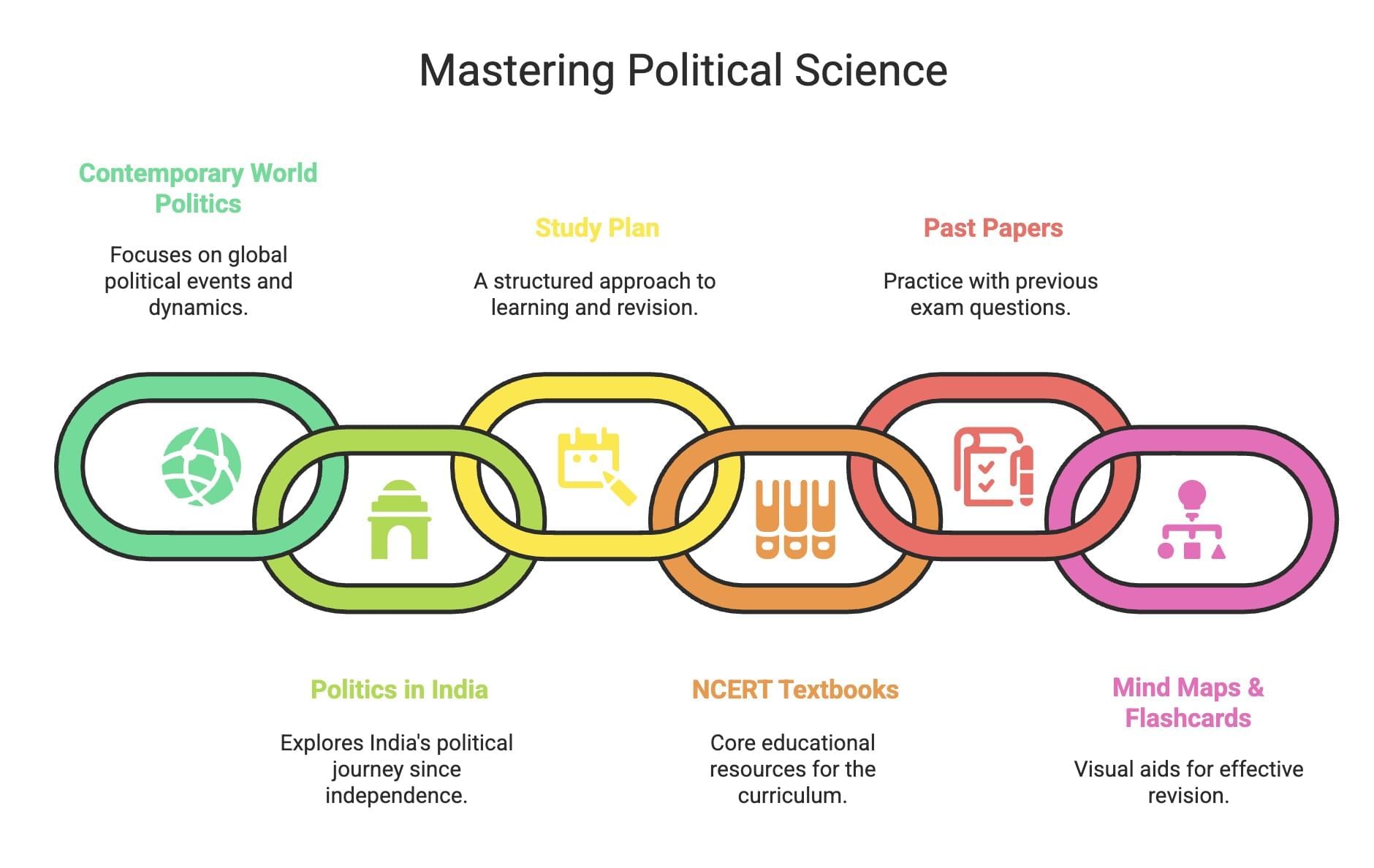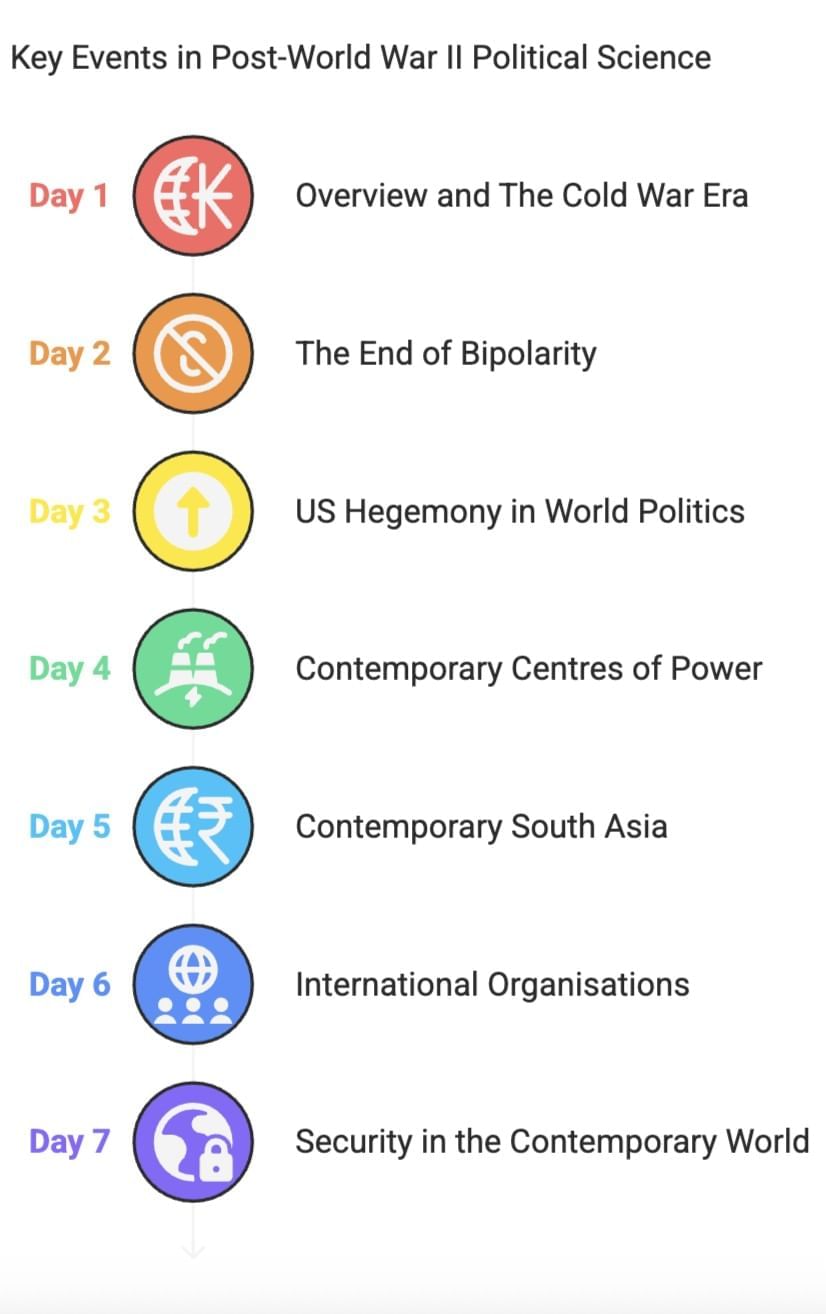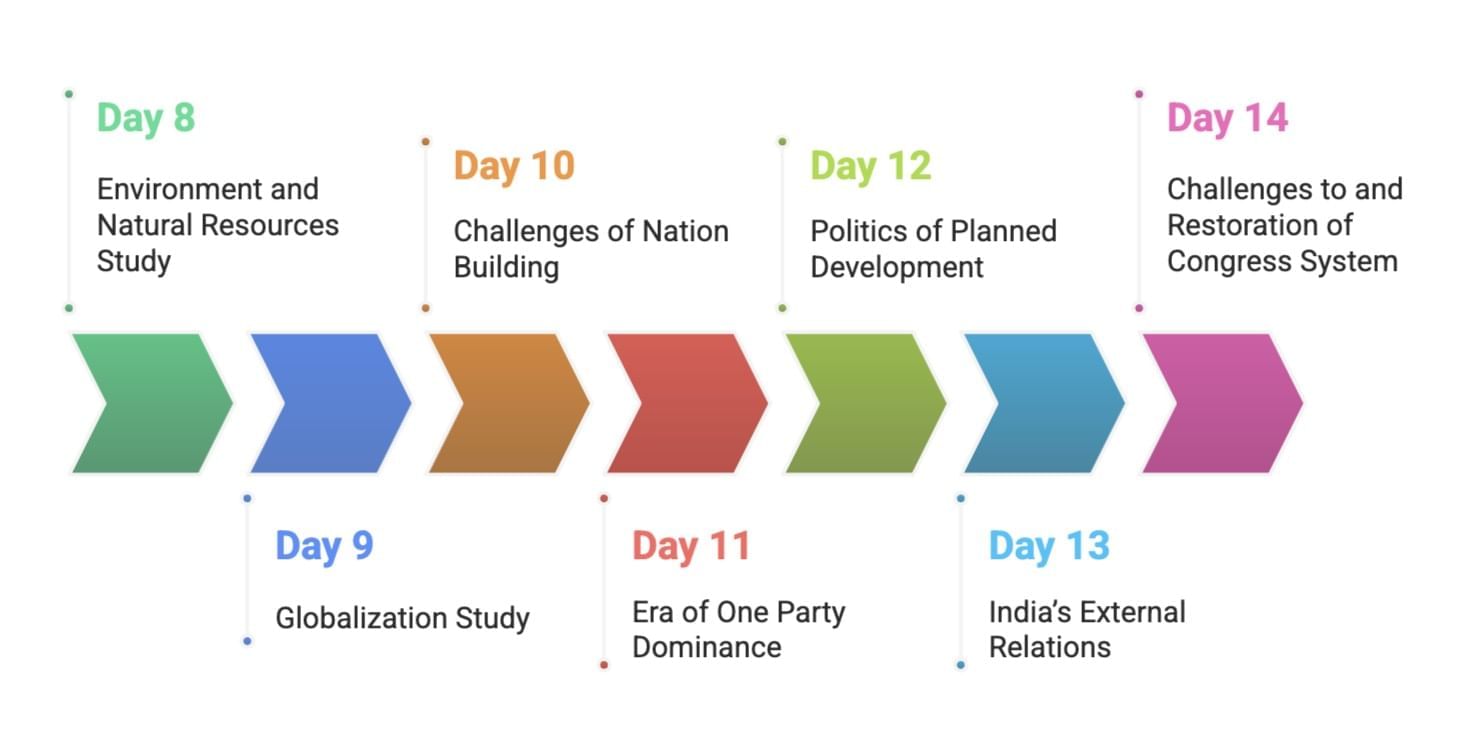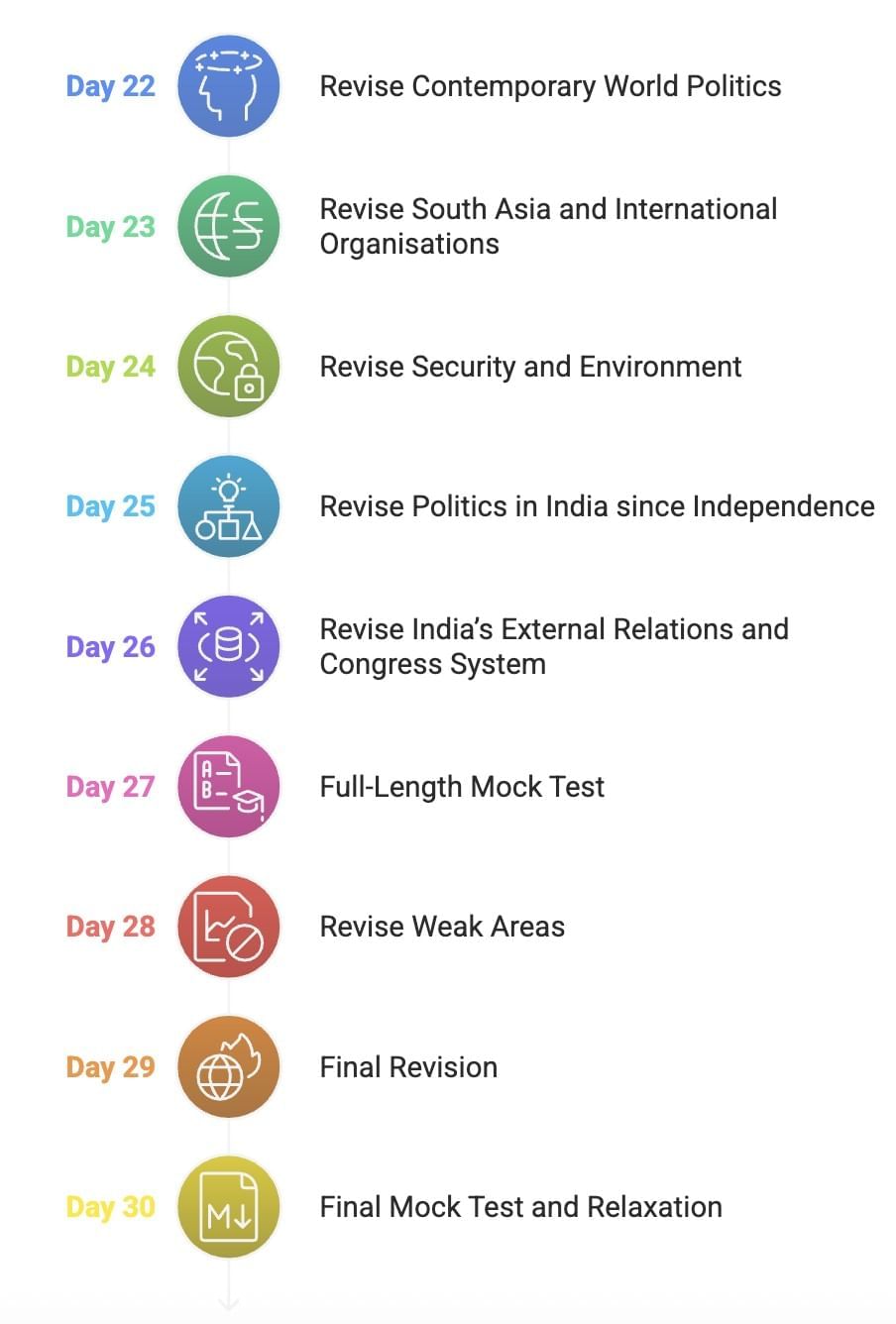30 Day Study Plan: Political Science Class 12 | Political Science Class 12 - Humanities/Arts PDF Download
Introduction
The Political Science Class 12 curriculum is a comprehensive exploration of global and Indian political dynamics, covering key themes such as contemporary world politics and India’s political journey since independence. The syllabus is divided into two parts: Contemporary World Politics and Politics in India since Independence. This 30-day study plan is designed to help you master these topics systematically, ensuring you understand key concepts, practice application-based questions, and excel in your board exams. By following this plan, you’ll cover NCERT textbooks, solve past papers, and use resources like mind maps and flashcards for effective revision. The plan strikes a balance between learning, practice, and revision to build confidence and clarity.

Week 1: Foundation Building (Days 1-7)
Day 1: Overview and The Cold War Era
Begin with an overview of the Political Science syllabus and focus on the Cold War era, understanding its origins, key events like the Cuban Missile Crisis, and the Non-Aligned Movement.
- Read: Syllabus: Political Science for Class 12
- Study: Chapter Notes: The Cold War Era
- Watch: The Cold War
- Practice: Previous Year: Short Questions with Answers - The Cold War Era
Day 2: The End of Bipolarity
Study the collapse of the Soviet Union, shock therapy, and its consequences. Understand the shift from a bipolar to a unipolar world.
- Read: NCERT Textbook - The End of Bipolarity
- Study: Chapter Notes: The End of Bipolarity
- Practice: Test: The End of Bipolarity - 1
Day 3: US Hegemony in World Politics
Learn about the rise of US dominance post-Cold War, including events like Operation Enduring Freedom and the Indian-American relationship.
- Read: Chapter Notes: US Hegemony in World Politics
- Watch: US Hegemony in World Politics
- Practice: Test: US Hegemony In World Politics - 1
Day 4: Contemporary Centres of Power
Explore alternative power centres like the European Union, ASEAN, and India-China relations.
- Read: NCERT Textbook - Contemporary Centres of Power
- Study: Chapter Notes: Contemporary Centres of Power
- Practice: Important Questions: Contemporary Centres of Power
Day 5: Contemporary South Asia
Study the political dynamics of South Asia, focusing on India-Pakistan and India-China relationships.
- Read: NCERT Textbook - Contemporary South Asia
- Watch: India-Pakistan Relationship
- Practice: Test: Contemporary South Asia - 1
Day 6: International Organisations
Understand the role of the United Nations, its structure, and the need for reforms.
- Read: NCERT Textbook - International Organisations
- Study: Chapter Notes: International Organisations
- Practice: Test: International Organisations
Day 7: Security in the Contemporary World
Learn about traditional and non-traditional security concepts, including cooperative security.
- Read: NCERT Textbook - Security in the Contemporary World
- Watch: What is Security?
- Practice: Test: Security In The Contemporary World

Week 2: Deepening Understanding (Days 8-14)
Day 8: Environment and Natural Resources
Study global environmental issues, geopolitics, and the politics of natural resources.
- Read: NCERT Textbook - Environment and Natural Resources
- Watch: What is Environmental Concerns in Global Politics?
- Practice: Test: Environment & Natural Resources
Day 9: Globalisation
Understand the causes, characteristics, and impacts of globalization on politics and culture.
- Read: NCERT Textbook - Globalisation
- Study: Causes and Characteristics of Globalization
- Practice: Test: Globalisation
Day 10: Challenges of Nation Building
Explore the challenges faced by India post-independence, including partition and princely state integration.
- Read: NCERT Textbook - Challenges of Nation Building
- Study: Integration of Princely States
- Practice: Test: Challenges Of Nation Building
Day 11: Era of One Party Dominance
Study the dominance of the Congress party and the first general election in India.
- Read: NCERT Textbook - Era of One Party Dominance
- Watch: First General Election
- Practice: Test: Era Of One Party Dominance
Day 12: Politics of Planned Development
Learn about India’s planning process, Five-Year Plans, and the Green Revolution.
- Read: NCERT Textbook - Politics of Planned Development
- Study: Green Revolution
- Practice: Test: Politics Of Planned Development
Day 13: India’s External Relations
Understand India’s foreign policy and key events like the Indo-China War of 1962.
- Read: NCERT Textbook - India’s External Relations
- Watch: The Indo-China War of 1962
- Practice: Test: India’s External Relations
Day 14: Challenges to and Restoration of Congress System
Study the challenges faced by the Congress party and its restoration, including the Congress split.
- Read: NCERT Textbook - Challenges to and Restoration of Congress System
- Watch: The Congress Split
- Practice: Test: Challenges To and Restoration of Congress System - 1

Week 3: Advanced Concepts and Practice (Days 15-21)
Day 15: The Crisis of Democratic Order
Learn about the Emergency period and its impact on Indian democracy.
- Read: NCERT Textbook - The Crisis of Democratic Order
- Watch: Background of Emergency
- Practice: Test: The Crisis Of Democratic Order
Day 16: Regional Aspirations
Study regional movements in India, such as those in Kashmir, Punjab, and the Northeast.
- Read: NCERT Textbook - Regional Aspirations
- Watch: Summary - Regional Aspirations (Part - 1)
- Practice: Test: Regional Aspirations - 1
Day 17: Recent Developments in Indian Politics
Explore post-1990s political changes, including coalition politics and new political parties.
- Read: NCERT Textbook - Recent Developments in Indian Politics
- Watch: Recent Developments In Indian Politics
- Practice: Test: Recent Developments In Indian Politics
Day 18: Rise of Popular Movements
Understand the role of social and political movements in India, such as the Chipko Movement.
- Read: Chapter Notes: Rise of Popular Movements
- Study: Important Questions: Rise of Popular Movements
- Practice: Test: Rise Of Popular Movements
Day 19: Previous Year Questions (PYQs)
Solve previous year short and long questions from multiple chapters to understand exam patterns.
- Practice: Previous Year: Short Questions with Answers - The End of Bipolarity
- Practice: Previous Year: Long Questions with Answers - The End of Bipolarity
- Practice: Previous Year: Short Questions with Answers - Challenges of Nation Building
Day 20: Assertion and Reason Questions
Practice assertion and reason type questions to improve critical thinking skills.
- Practice: Test: The End of Bipolarity - Assertion and Reason Type Questions
- Practice: Test: Era of One Party Dominance - Assertion and Reason Type Questions
Day 21: Case-Based Questions
Focus on case-based questions to enhance analytical skills.
- Practice: Test: The End of Bipolarity - Case Based Type Questions - 1
- Practice: Test: Contemporary Centres of Power - Case Based Type Questions

Week 4: Revision and Mock Tests (Days 22-30)
Day 22: Revise Contemporary World Politics
Review key concepts from The End of Bipolarity, US Hegemony, and Contemporary Centres of Power using mind maps.
- Revise: Mind Map: The End of Bipolarity
- Revise: Mind Map: Contemporary Centres of Power
- Practice: NCERT Solutions - The End of Bipolarity
Day 23: Revise South Asia and International Organisations
Review Contemporary South Asia and International Organisations using flashcards and NCERT solutions.
- Revise: Flashcards: Contemporary South Asia
- Revise: NCERT Solutions - International Organisations
- Practice: Important Questions: International Organisations
Day 24: Revise Security and Environment
Review Security in the Contemporary World and Environment and Natural Resources.
- Revise: Mind Map: Security in the Contemporary World
- Revise: Flashcards: Environment and Natural Resources
- Practice: Important Questions: Environment & Natural Resources
Day 25: Revise Politics in India since Independence
Review Challenges of Nation Building, Era of One Party Dominance, and Politics of Planned Development.
- Revise: Mind Map: Challenges of Nation Building
- Revise: NCERT Solutions - Politics of Planned Development
- Practice: Previous Year: Short & Long Questions with Answers - Politics of Planned Development
Day 26: Revise India’s External Relations and Congress System
Review India’s External Relations and Challenges to and Restoration of Congress System.
- Revise: Mind Map: India’s External Relations
- Revise: Flashcards: Challenges to and Restoration of Congress System
- Practice: Important Questions: India’s External Relations
Day 27: Full-Length Mock Test
Take a full-length mock test covering both books to simulate exam conditions.
- Practice: Class 12 Political Science: CBSE Sample Question Papers (2024-25)
- Review: Analyze mistakes and revisit weak areas using Revision Notes - The End of Bipolarity.
Day 28: Revise Weak Areas
Focus on topics where you struggled in the mock test. Use flashcards and revision notes for quick review.
- Revise: Flashcards: The End of Bipolarity
- Revise: Revision Notes - Recent Developments in Indian Politics
- Practice: Solve 10-15 questions from weak areas.
Day 29: Final Revision
Review all chapters using mind maps and NCERT solutions. Focus on key terms and concepts.
- Revise: Mind Map: Globalisation
- Revise: NCERT Solutions - Regional Aspirations
- Practice: Solve 5-10 passage-based questions from Passage Based Questions: Globalisation - 1
Day 30: Final Mock Test and Relaxation
Take another full-length mock test. Relax and avoid studying new topics. Build confidence for the exam.
- Practice: Class 12 Political Science Official Sample Question Paper (2023-24)
- Review: Analyse performance and ensure readiness.

Tips for Success
- Read NCERT Thoroughly: NCERT textbooks are the backbone of the syllabus. Ensure you understand all concepts before moving to additional resources.
- Practice Past Papers: Solve previous year papers to familiarise yourself with question patterns and improve time management.
- Use Visual Aids: Mind maps and flashcards help in quick revision of key concepts and terms.
- Focus on Application: Practice assertion-reason and case-based questions to develop analytical skills.
- Time Management: Allocate specific times for reading, practising, and revising each day to stay disciplined.
- Stay Updated: For topics like Recent Developments in Indian Politics, stay aware of current political trends.
- Take Breaks: Avoid burnout by taking short breaks and maintaining a positive mindset.
|
36 videos|436 docs|77 tests
|
FAQs on 30 Day Study Plan: Political Science Class 12 - Political Science Class 12 - Humanities/Arts
| 1. What are the key components of the 30-day study plan for Political Science in Class 12? |  |
| 2. How can I effectively use the revision week to prepare for my Political Science exam? |  |
| 3. What are some effective study tips for mastering Political Science concepts? |  |
| 4. What types of questions can I expect in the Political Science exam for Class 12? |  |
| 5. How can I assess my progress throughout the 30-day study plan? |  |




















